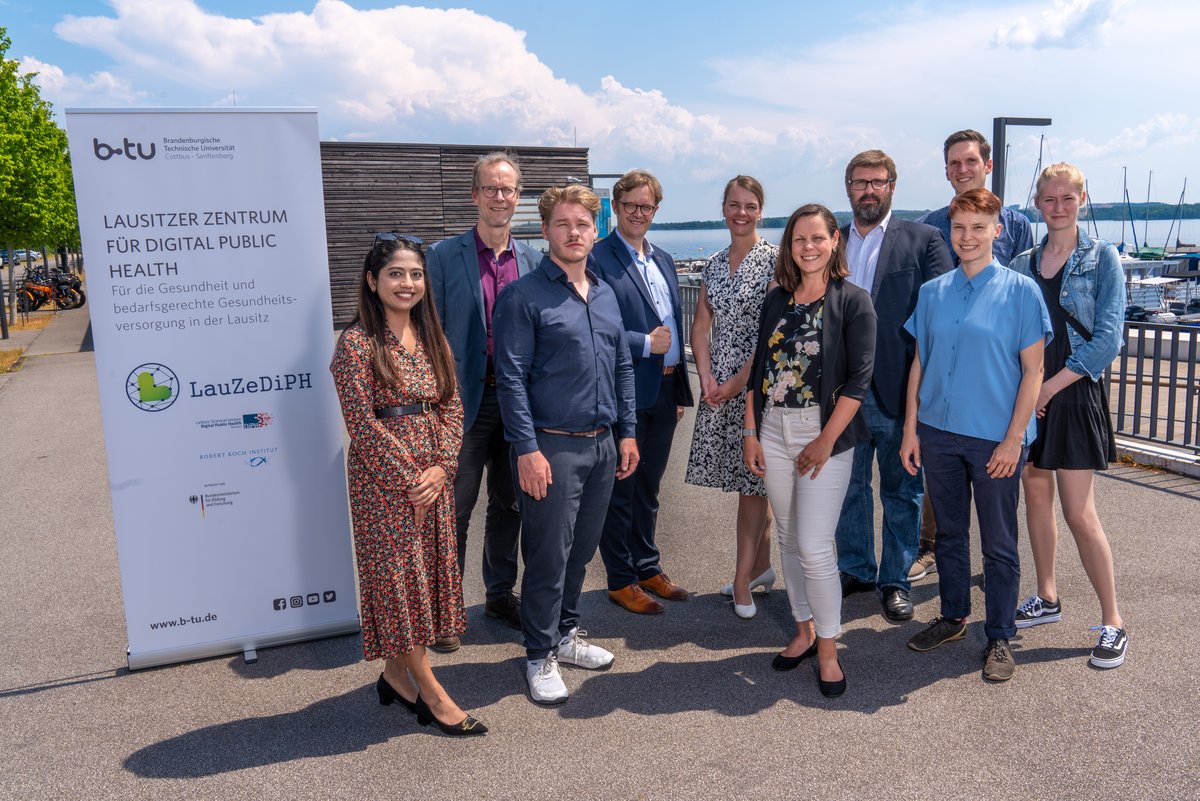Using apps, trackers and online platforms to deliver ideal healthcare
People's health is closely linked to the circumstances in which they grow up and live. Digital health services are becoming increasingly relevant in everyday life. They hold potentials, but also risks in terms of disease prevention, health promotion and health care. In collaboration with the Robert Koch Institute and the Leibniz Science Campus Digital Public Health, scientists* at the new Lausitz Center for Digital Public Health (LauZeDiPH) in Senftenberg are researching these aspects for the population in Lausitz.
"Our central concern is to find out how the further development of health care, promotion and research in Lusatia, supported by digital solutions, can improve the situation of people in reality and reduce health inequalities," explains Prof. Dr. Jacob Spallek, who heads the new center. "Since access, use and effects of health services are often distributed differently in the population, we need knowledge about what concrete needs exist and what ideas people have locally regarding the further development of health care."
Federal Minister of Education and Research Bettina Stark-Watzinger explains: "The use of digital technologies is a great opportunity for the further development and improvement of healthcare. However, this opportunity can only be realized if the needs and requirements of citizens are the focus. The Lusatian Center for Digital Public Health (LauZeDiPH) therefore focuses precisely on these new, digital health offerings. The goal is clear: With its research results, the Lusatian Center will contribute to the development of tailored health promotion and prevention measures. That's why the Federal Ministry of Research is funding this promising center with more than four four million euros over the next nine years."
Brandenburg's Minister of Science Dr. Manja Schüle said, "Our healthcare system is facing a variety of challenges. We need more doctors - and we need answers as to how high-quality medical and nursing care can be ensured in the future. Our answer: the establishment of a university medical center in Cottbus with a focus on health system research and the digitization of the healthcare system - one of the state government's most ambitious projects in the structural development of Lusatia. The new Lusatian Center for Digital Public Health at the BTU is a perfect complement to our university medicine and a welcome strengthening of Senftenberg as a study location. I am convinced that this will make it possible to develop new care models for rural regions and ensure medical care close to home - in the interests of the people. The structural strengthening funds are money well spent."
BTU President Prof. Dr. Gesine Grande: "With the Lusatian Center for Digital Public Health, we are creating new approaches and opportunities for digital disease prevention, health promotion and care in structurally weak rural areas. Digital technologies hold new opportunities for a self-determined role of patients in the treatment process and strengthen their health competence. Together with scientific partners such as the Robert Koch Institute and the Leibniz Institute for Prevention Research and Epidemiology as well as health experts from the region, we are further expanding health research along our profile line 'Health and Life Science' at our site in Senftenberg."
Perspectives, needs and ideas of the people of Lusatia
The scientists collect new data and link it with existing data from various areas of health care, population statistics and health reporting to create a comprehensive database on health, health care and living conditions in Lusatia for research. In this context, the collection and presentation of the population's own perspectives, needs and perceptions form a focal point of the new center - in particular in the context of the structurally changing living conditions in the region.
"The survey of objective and subjective care needs as well as people's attitudes toward digital offerings serves to develop needs and wants-oriented offerings for both individual care practices and population-based programs," says Stephanie Hoffmann, summarizing the goals of the Lusatian Center for Digital Public Health. The research associate in the chair of health sciences at BTU is coordinating the new center.
"We are pleased to be able to conduct research together with our partners in Lusatia on key issues related to digital technologies for public health and health care," says Prof. Dr. Hajo Zeeb, spokesperson for the Leibniz ScienceCampus Digital Public Health and head of the Department of Prevention and Evaluation at the Leibniz Institute for Prevention Research and Epidemiology - BIPS. He adds, "The Leibniz ScienceCampus in Bremen has gained a lot of valuable experience and knowledge over the years, which we can now build on together."
"The digitization of health promotion, disease prevention and health care in the Lausitz region of structural change promises long-term structural additions, with opportunities for maintaining and improving the health situation and care of the population," says Katharina Ladewig, Center for Artificial Intelligence in Public Health Research (ZKI-PH). "I am pleased that we can finally start our project to establish LauZeDiPH to enable continuous analysis of population health (so-called surveillance) of Lusatia as well as to measure long-term intervention effects. The results will find important anchor points in regional structural change."
With the Center for Artificial Intelligence in Public Health Research of the Robert Koch Institute (ZKI-PH) in Wildau and the Leibniz Science Campus Digital Public Health (LSC) from Bremen, cooperation partners with proven expertise in data management - including Big Data, Artificial Intelligence - as well as in evidence-based and digitalization in public health and prevention are involved in the project. The project is funded over a period of nine years by the German Federal Ministry of Education and Research (BMBF) as part of the Coal Structural Strengthening Act. The Lusatian Center for Digital Public Health is part of the Lausitz Science Park and is the second approved project of the Biotech-Health Campus, which is currently being established at the BTU Cottbus-Senftenberg campus in Senftenberg.
Contact


